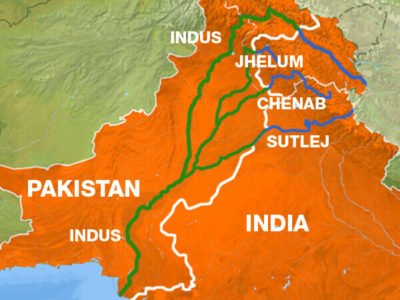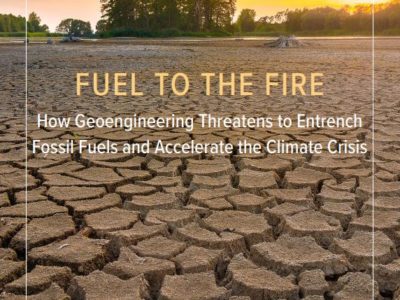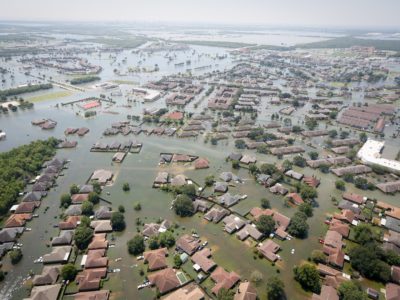The 2019 Oscars Has a Climate Change Contender
Paul Schrader’s First Reformed nominated for best original screenplay
Clear your calendar and prepare your popcorn – the 2019 Oscars will be awarded on Sunday night. This year climate change has a contender, and no, it’s not An Inconvenient Sequel. In the category of original screenplay, Paul Schrader has been nominated for First Reformed, a contemporary tale about the struggles of a priest in upstate New York grappling with the death of his son, a parishioner’s anguish over environmental destruction, and the corruption of hi...
CONTINUE READINGA Time For Privacy: California Legislature Moves to Protect Academic Research
In an era defined in Washington by lies and the suppression of scientific research, California is positioning itself as a defender of facts and free inquiry. Assemblymember Laura Friedman (D, Los Angeles) this week introduced Assembly Bill 700, a bill sponsored by the Union of Concerned Scientists (UCS) to address the harm inflicted on public university scholars by harassing requests under the California Public Records Act. Records requests are made to harass rather ...
CONTINUE READING…For Fighting Over
Nuclear-Armed India Announces Water Cut-Off To Nuclear-Armed Pakistan
Uh-Oh: Union minister Nitin Gadkari in a tweet has confirmed that India would 'choke' the water supply to Pakistan in light of the Pulwama attack. The move comes in the backdrop of the February 14 attack on CRPF convoy in Pulwama in Jammu and Kashmir, which resulted in the death of 40 CRPF personnel. India will divert water from eastern rivers and supply it to the people of Jammu & Kashmir and Punjab, read Gadkari's tweet. Under the Indus Waters Treaty, India sha...
CONTINUE READINGBottoms-Up! An Emerging New Governance System (3)
Bottom-up strategies can ultimately pave the road for stronger international agreement.
It is difficult to measure the extent of positive feedback between climate initiatives. But it seems evident that such feedback does exist. A major climate initiative in one jurisdiction seems to encourage climate action elsewhere. This makes climate action a more appealing prospect for any individual jurisdiction, because by acting it can increase climate actions elsewhere. But at some point, it’s also going to be important to have a globe-wide effort to coordinate ...
CONTINUE READINGBuild, Baby, Build?
New Study Points To More Sophisticated Analysis of Upzoning - And Perhaps Surpassing the Stale Gentrification Debate
A couple of weeks ago, I noted a study casting some doubt on whether upzoning leads to a decline (or at least a stabilization) of housing prices. The theory is that by building more, developers are simply inducing demand, pushing out low-income people, and not reducing overall prices because of the higher demand. It would be the housing equivalent of building more freeways and getting more congestion as a result. Now here comes a study suggesting that building more does ...
CONTINUE READINGPublic Lands Watch: Natural Resources Management Act
Legislation in Congress would expand parks, permanently authorize conservation fund
This blog post was drafted by Jamie T. Martinez. On February 12, the Senate passed the Natural Resources Management Act (NRMA), 92-8. What does the NRMA do? Simply put: a lot. If passed by the House of Representatives and signed by the President, the NRMA will protect approximately 1.3 million acres as wilderness areas, expand eight national parks, create three national park units, and much more. The bi-partisan NRMA packs something for everyone in its 662 pages. ...
CONTINUE READINGChina in the Global Environment — Q&A with Isabel Hilton, Founder and CEO of chinadialogue.net
Isabel Hilton is a leading journalist whose current work spotlights the impact of China’s growing economy on people and the environment. Her work has appeared in the Financial Times, The New York Times, the Los Angeles Times, The Guardian, the New Yorker, and many other publications. In 2006, Hilton launched chinadialogue.net, a groundbreaking website that publishes reporting and analysis on China environment issues in both English and Mandarin. This month, ...
CONTINUE READINGNational Security, Climate Change, and Emergency Declarations
If the Supreme Court upholds Trump, it will have to uphold an emergency declaration for climate change.
Trump finally pulled the trigger today and declared a national emergency so he can build his wall. But if illegal border crossings are a national emergency, then there’s a strong case for viewing climate change in similar terms. That point has been made by observers ranging from Marco Rubio to Legal Planet’s own Jonathan Zasloff in a post last week. I agree but I want to dig deeper because it's such an important point. In order to uphold Trump’s emergency declara...
CONTINUE READINGDoes the Fossil Fuel Industry Support Geoengineering?
A misleading new report from Center for International Environmental Law and the Heinrich Boell Foundation demeans the discourse
Geoengineering is controversial in the climate change community, and understandably so. Proposed interventions like negative emissions technologies (a.k.a. carbon dioxide removal) and solar geoengineering (a.k.a. solar radiation management or SRM) -- which some writers group together as "geoengineering" -- involve large-scale intervention in the climate system that could have adverse physical or social impacts. At the same time, some geoengineering methods could substant...
CONTINUE READINGI’ll Just Be Over Here In My Fallout Shelter
The Green New Deal may be ambitious, but it’s not alarmist.
It would be impossible to react to every piece of misinformation or poor reporting about climate change—let alone every misguided opinion editorial—that lives online today, but Bret Stephens’ February 15 piece in the New York Times strikes me as warranting a response. That’s not because of the clickbait title (“Is Nancy Pelosi A Climate Skeptic?” You guessed it, she’s not.) or the now oft-repeated criticism of the Green New Deal (it’s too pie-in-the...
CONTINUE READING











